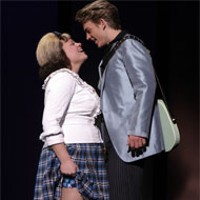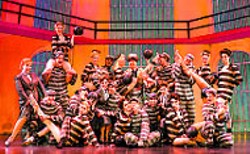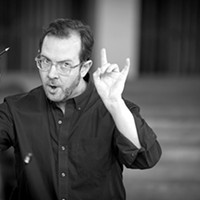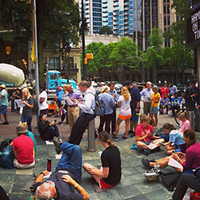No, this supremely irreverent and vulgar concoction is built from far sturdier stuff. Clever as it was, the storyline of Mel Brooks's 1968 Oscar-winning screenplay only required a relatively brief interlude of extravagant musical tastelessness. We followed sleazeball producer Max Bialystock and his timorous cohort Leo Bloom onscreen as they schemed to pocket the generous financial backing for their surefire flop. Only when the new Bialystock abortion hit the musical stage was Brooks obliged to pen the requisite schlock.
To triumph on Broadway as a musical, the roster of melodies for The Producers had to be expanded from two to 18 -- with no precipitous drop-off from the standard set by the legendary "Springtime for Hitler." With his trademark chutzpah, Brooks tackled the challenge, collaborating on the stage adaptation with Thomas Meehan and writing all the new lyrics and tunes himself.
Brooks merrily slashes through the pieties of art, philosophy and political correctness -- funniest when he's committing multiple atrocities simultaneously. Seeking out the worst possible director for Springtime, Bialystock finds Roger De Bris, whom Brooks has cross dressing to look like the Chrysler Building. Then announcing their aesthetic in "Keep It Gay," De Bris and his swishy paramour affront the sensibilities of gays -- not to mention playwrights and critics stretching back to Sophocles and Aristotle -- by proclaiming:
"Oedipus won't bomb
If he winds up with Mom!"
On a fundraising junket to Little Old Lady Land, we find similar sacrilege committed upon big production numbers and nursing homes. In "Along Came Bialy," octogenarians fill the stage, dancing with the assistance of walkers. At one point before showering Max with $2 million in "little checkies," the fleeced lambkins perform a tap dance -- standing in place while they make the walkers do the hoofing.
But the main energy source of comedy in The Producers is the cosmic collision of stern Nazi arrogance with florid Ziegfeld pretension. Dolled up in inspired dress designs by William Ivey Long, the master race is personified in the "Springtime for Hitler" extravaganza by a parade of Aryan honeys sporting supersized porcelain beer steins, a horned Valkyrie helmet, a colossal pretzel and a humongous sausage. Truly a confluence of the worst with the wurst.
The Ovens stage has too much width and too little height to be an ideal venue for this touring show. But Brooks & Co. have definitely spent the dough to make production values comparable to the Broadway production in every way, down to the smart homing pigeons with their Nazi armbands.
With all this in the show's favor, it can withstand the curiously mechanical performance of Lewis J. Stadlen as Max, all calculated energy with little genuine gusto. Momentum picks up with the entrance of Alan Ruck, easily the equal of the overrated Broderick as Leo. The gay and Nazi eccentrics are wonderful. Michael McCormick has a crazed jollity as Franz Liebkind, the twisted creator of "Springtime." All the necessary vanity and effeminacy are marshaled together for Lee Roy Reams's turn as De Bris -- plus the prissy Hitler -- while Harry Bouvy is nothing short of flaming as his factotum, the super-supercilious Carmen Ghia.
Crowning the winning impression left by The Producers are the long luscious limbs of Charley Izabella King as Ulla, the Swedish bombshell. Shamelessly objectified from the moment her divine form materializes in Max's office, King delivers a pathetic accent without a country. But she's impressively athletic and musical, a desk accessory surpassing most accountants' wildest dreams.
Upstairs at the PAC, you have to wonder what Charlotte Rep is thinking. They've waited to open Yasmina Reza's Art a full six years after the cerebral comedy captured the Tony Award -- and four years after the fine touring version starring Judd Hirsch played downstairs at the Belk.If the choice and timing are puzzling, the production directed by Dave Mowers succeeds in giving a new slant to the script's dialectic and infusing it with fresh heart. Mowers ignores the playwright's call for an unchanging "neutral" set. So instead of the white-on-white-on-white spectacle you may have caught in the Broadway Lights Series, the all-white painting Serge buys for 200,000 francs now stands apart from large, vivid, contrasting blocks of color surrounding it.
That's just a first step in legitimizing Serge's purchase. In his Rep debut, Martin Thompson brings a suavity to Serge that I've never seen before. His smugness is usually a quality we associate with Marc, Serge's anti-modernist friend who disapproves so arrogantly of the art acquisition. Alan Edwards is angry and arrogant enough as Marc, but the newfound sophistication Thompson bestows on Serge -- and the memory of Hirsch -- diminish his controlling authority.
Yvan is the self-acknowledged lightweight who finds himself torn apart in this unexpectedly fierce battle of titans. I may have seen a more comical Yvan than Steve Brady's, but Yvan's anguish never touched me until Brady sank his teeth into the marrow of his most wrenching monologues.
Reason enough to catch Rep's Art, even if the play left you cold before.
Opera Carolina revved up its season in fine style, offering a flashy production of Verdi's Macbeth in its long-overdue Charlotte premiere. Watching the Scottish king's final encounter with the witches, I could actually feel the heat of the final lightning flash in Row N!The royal couple wasn't quite that hot. Mark Rucker tended to waddle across the stage in the title role rather than striding decisively like a bloodthirsty warrior. But his rich baritone gripped the music forcefully as the wheel of fortune lifted him to the throne, and Rucker melted quite convincingly as he perceived the sport that the witches and the fates were making of him.
With her flowing red hair (or wig), soprano Jeanne-Michelle Charbonnet cut quite an imposing figure as Lady Macbeth. Listening to her steely voice steamrolling through her arias and cabalettas -- sour at first, but sweeter when she warmed up -- you'd hardly suspect that most divas embellish the wicked temptress's music with trills and coloratura filigree.
You might say that Charbonnet was often more like Shakespeare's Lady M than Verdi's. Perhaps that was OC artistic director James Meena's intent since he leaned heavily on the Bard's original text for his supertitles. He also did a fine job with the musical atmospherics in guiding the Charlotte Symphony through the score.
Speaking of Arts_performance.html
-

Sailing With Hamlet
Jul 20, 2005 -

Proud To Be Plump
Jul 6, 2005 -

Putting The Sell In Cellulite
Jun 29, 2005 - More »
Latest in Performing Arts
More by Perry Tannenbaum
Calendar
-
An Evening With Phil Rosenthal Of "Somebody Feed Phil" @ Knight Theater
-
Kountry Wayne: The King Of Hearts Tour @ Ovens Auditorium
-

NEW WINDOW GALLERY-Pat Rhea-ACRYLIC PAINTINGS-April 05-30 2024 VALDESE, NC 28690 @ New Window Gallery/Play It Again Records
- Through April 30, 12 p.m.
-

Trap & Paint + Karaoke @ Zodiac Bar & Grill
-

LIVE MUSIC FRIDAYS!!! @ Elizabeth Parlour Room
-
Fall Guide: Upcoming festivals, comedy shows, visual arts events and more
-
Holiday Gift Guide
26 ways to shop local this holiday season
-
Halo 4 earns critical hallelujahs
Plus, news on Mass Effect Trilogy, LEGO: The Lord of the Rings














